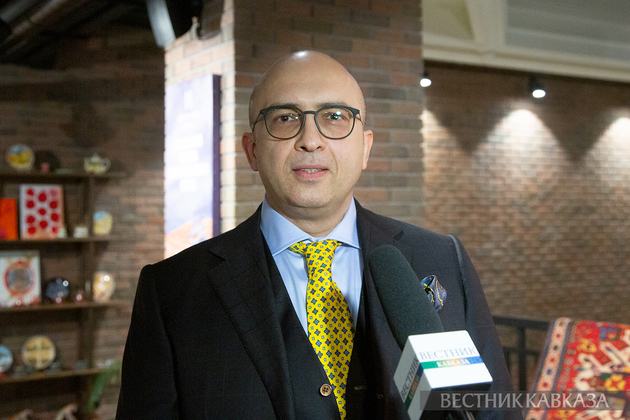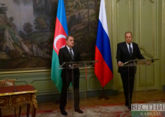© Photo: Maria Novoselova/Vestnik Kavkaza
A week ago, Moscow and Baku adopted a new large-scale program for the development of allied relations - the 2024-2026 Road Map. Vestnik Kavkaza spoke with the trade representative of Azerbaijan in the Russian Federation Ruslan Aliyev about the results of a 5-year development of the Russian-Azerbaijani economic relations and prospects in the coming years.
- Ruslan Allahverdievich, in what areas is trade between the two countries developing most actively?
- I would like to note that 2023 for Azerbaijani-Russian relations in a certain sense became a landmark year - the final year of implementation of the measures defined by the Road Map in the main directions of development of Azerbaijani-Russian cooperation for 2018-2023.
Today, Russia is one of the primary foreign economic partners of Azerbaijan. Trade turnover with the Russian Federation is nearly 9% of the total foreign trade turnover of our country. As in previous years, in 2023, trade turnover between our countries grew at a high rate and reached a record figure of $4.3 bln, which is 18% higher than in 2022.
Traditionally, over the past year, exports from Azerbaijan to Russia were dominated by fruits (35%), plastic (22%), vegetables (17%), natural gas (about 5%), as well as alcoholic and non-alcoholic beverages (3%). And imports from Russia to Azerbaijan were dominated by crude oil, ferrous metals and associated goods, grains, timber, natural gas, electrical equipment, etc.
Of course, we have great potential for even greater development of trade relations, and in this regard, government and business structures of both countries are carrying out appropriate work in order to realize the existing opportunities for further growth.
A good foundation for the progressive development of trade and economic relations between our countries was laid by the signing late last year of the “Road Map for the Development of Key Areas of Azerbaijani-Russian Cooperation for 2024 – 2026.”
- How are trade and economic relations between Azerbaijan and the regions of the Russian Federation developing?
- Building interaction directly between Azerbaijan and the regions of Russia is an important part of trade and economic ties between our countries. Great importance is attached to such cooperation in both countries at the highest government level.
It is no coincidence that, since 2009, Azerbaijan-Russian interregional forums have been held annually. They are an effective platform for interaction between entrepreneurs of the two countries.
Currently, over 70 Russian entities are developing cooperation with Azerbaijan. 18 of them already have agreements on trade, economic, scientific, technical and cultural interaction, draft agreements are under consideration with 14 entities. Intergovernmental commissions operate with 4 constituent entities (the city of Moscow, the city of St. Petersburg, the Republic of Tatarstan and the Republic of Dagestan).
In addition, representative offices of the republics of Dagestan and Tatarstan operate in Baku. The Azerbaijan Business Center operates in Astrakhan, and the Astrakhan Business Center operates in Baku. An Azerbaijani Wine House has been opened in the city of Yekaterinburg.
The leaders in interregional trade turnover with Azerbaijan are Moscow, Krasnodar Territory, Stavropol Territory, Moscow, and Sverdlovsk regions. The top 10 main trading partners also include the Republic of Tatarstan, Volgograd, Saratov regions and the city of St. Petersburg.
- The road map until 2026 plans for state support for small and medium-sized businesses. What support measures are needed foremost?
-The development of small and medium-sized businesses is considered as another serious segment of commodity producers, capable of giving a new impetus to the expansion of trade and economic relations between our countries.
As is known, mechanisms to support small and medium-sized businesses have been created and operate effectively in both countries. Thus, the Small and Medium Business Development Agency has been operating in Azerbaijan since 2018. Accordingly, the procedures for registration, obtaining licenses and permits, etc. have been significantly simplified.
The agency participates in the process of improving mechanisms for protecting the interests of small and medium-sized businesses, and also finances educational, scientific, research and support projects related to the development of micro, small and medium-sized businesses. 50% of the costs of research conducted at the request of a small business entity are covered by the state. As part of this support mechanism, medium-sized businesses can take advantage of free training, seminars and information support.
In addition, to support this sector, SMEs are also provided with significant benefits. They are exempt from income, land, and property taxes for 7 years, and from VAT on imported technical and technological equipment. Capital expenditures related income of small-scale enterprise cluster participants is partially tax-free for a period of 7 years. Preferential loans are also provided.
The inclusion of the issue of supporting SMEs in the Road Map is due to the aim of more widely involving entrepreneurs working in this segment in trade and economic relations between our countries and creating conditions for them to export their goods and services.
In order to achieve this goal, it is necessary to provide support to entrepreneurs in increasing their knowledge and competencies in matters related to foreign trade operations. This includes providing information on customs and other regulations in force in countries, requirements for quality and labeling of imported products; regularly reporting on the market situation for a particular product range in the domestic markets of the parties; create a mechanism to provide relevant advisory services.










